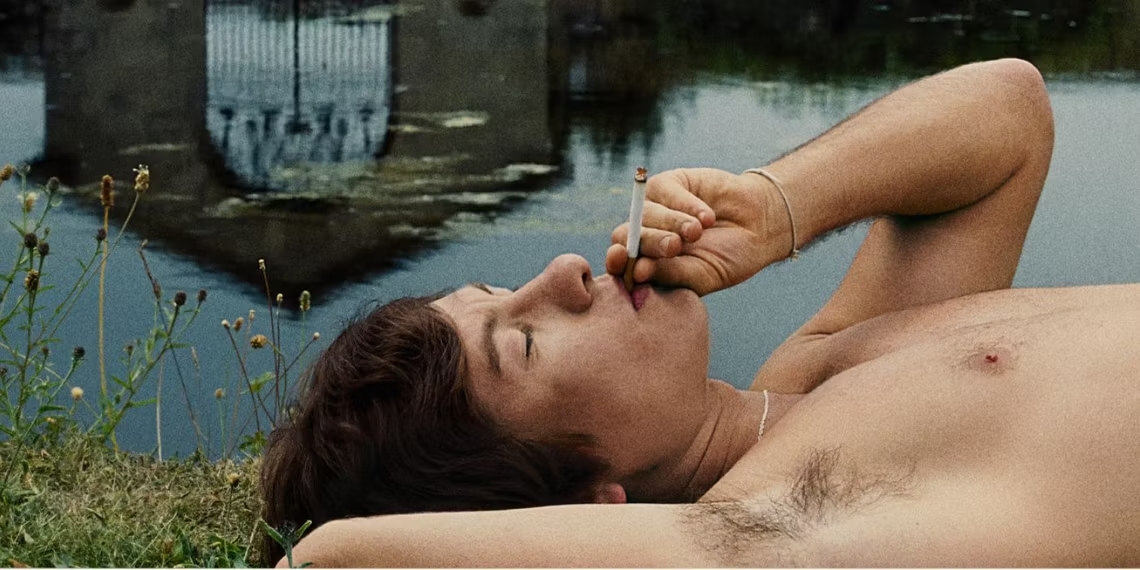
When I was 17, the schoolmaster tasked with overseeing my moral development frowned at my show of indecision about the future direction of my education and, as if letting me into a trade secret, carefully explained: “Look, clever people go to Cambridge, and pretty people: they go to Oxford.” This reflection — very poorly corroborated by the fact that I knew he’d been at St Hilda’s — baffled me enough to reoccur to me many months later, when, looking around at my fellow Oxford freshers, it was all too plain that a number of us had not got the memo. There were of course individuals whose uncomplicated beauty, charisma and self-possession made them a very natural fit for the city. But, there were others too, whose relationship to their surroundings was altogether more tormented.
Oxford has always offered sanctuary to the socially maladjusted and chronically ill-at-ease. At first glance, Emerald Fennell’s new film, Saltburn, might be an attempt to dramatise the resulting long-lived demographic tension of undergraduate life: the modus vivendi that must be established between those who effortlessly belong and those who find they can’t. Fennell is herself the Oxford-educated daughter of a multi-millionaire London jeweller, perhaps giving some indication of which side of the university’s social binary might have claimed her allegiance. Much like her first film, Promising Young Woman, Saltburn is propelled along by an enjoyable, rather unhinged, spirit of social paranoia. It is a film that is rather evidently entertained by itself and its own excesses. In fact, the film is so enjoyable that many of the curious errors and misconceptions that underscore its depiction of Oxford undergraduate life occur to one only as afterthoughts.
The film’s elevator-pitch is simple enough: the psychodrama of The Talented Mr Ripley imposed on the charmed setting of Brideshead Revisited. Oliver Quick (Barry Keoghan) is gormless and poor; Felix (Jacob Erlordi) is gorgeous and rich; both are first-years at Brasenose. After a few run-ins, Felix generously befriends Oliver, many rungs his social inferior, and invites him to spend the summer at Saltburn, his family’s country seat. Ripley-style, Oliver is revealed to be in the grip of an opaque desire at once to pursue, destroy, and in some sense become Felix, the object of his dark obsession.
He embeds himself in Felix’s life like a parasite, his fascination all the creepier for having a sexual dimension while lacking any straightforward sexual explanation. In one scene, having spied Felix masturbating in their shared bathroom through a crack in the door, Oliver waits for him to leave, then climbs into the tub and sucks the inseminated water out of the drain. But worse than this — much, much worse — is that Oliver is later discovered by Felix to have lied about his social background. He is not in fact working class, but a middle-class person engaging in “oppression cosplay”: a very Oxford touch. Fennell has correctly noticed that among today’s undergraduates, misleadingly playing down one’s privileged background might well be a more profitable form of social camouflage than playing it up.
That aside, the more one thinks about the fast-blossoming relationship between Oliver and Felix in the first act, the less sense it makes. Why exactly does Felix allow Oliver to penetrate his life to the degree that he does? Pity — the explanation the film seems to want the viewer to accept — is, as Oliver must know, not a very promising model for manipulation within the socially ruthless undergraduate circles in which Felix seamlessly moves. There are half-hearted attempts to suggest that the frisson of playing the role of saviour, or perhaps an acquired taste for the exoticism of poverty, might motivate Felix’s adoption of Oliver. (“I can see why Felix likes you,” his sister tells Oliver when meeting him — Yes? Please tell us! the viewer thinks — “you’re so… real”). But none of those interpretations of Felix’s motivations can be properly sustained for the reason that Felix, perhaps against the grain of our expectation, turns out to be consistently decent, sane and straightforward.
For similar reasons, it isn’t at all clear why Felix’s family seem so desperate for Oliver to stick around at Saltburn once he’s been invited up. Likely explanations as to why this berth might be made available to him — for instance, that Oliver is a sparkling conversationalist or accomplished social performer — are ruled-out by the film’s premise. Were he to have these qualities, Oliver wouldn’t have needed to trick Felix into friendship in the manner in which he turns out to have done. In general, the film suffers from a kind of uncertainty about how attractive a figure Oliver is supposed to be. He manipulates boldly but haphazardly, leaving the viewer wondering whether anyone capable of even occasionally pulling off the feats of seduction and role-playing he sometimes succeeds in would really be stuck in such a social rut to begin with.
If the degree to which Oliver succeeds at Saltburn is under-explained, the degree to which he fails to at Oxford is more so. In his first few days as a fresher, Oliver is mocked by his tutor for having read all the books on his reading list, and at dinner is shown to be a solitary loner adrift in a sea of convivial, urbane and already intimately acquainted others. The message seems to be that he is an isolated loser. But as anyone who has been there will know, and anyone who hasn’t should be able to guess, there are in fact countless Oliver Quicks at Oxford. For the most part they are fully-integrated, albeit lame, members of the community. Oliver would fit right in!
A conscientious but neurotic loner, the prototypical Oliver is probably a PPE-ist (rather than an English student, as Fennell imagines). He types away loudly in lectures and pulls a reliable 9 to 5 at his favourite desk in the college library; he may have been liberated by student life to the degree of making some inadvisable fashion choices and has perhaps even got a daring earring, all the while holding his underwhelming personality fixed. He goes on a few forgettable nights-out a term, prizes the limited social recognition he receives on the basis of fulfilling some thankless administrative role like being JCR secretary, and spends most of his evenings cooking enormously elaborate meals with his boring girlfriend in the staircase kitchenette. I encountered Oliver dozens of times at Oxford.
Saltburn may of course not intend to draw any deeper moral about Oxford’s social scene. Few of the satiric touches in the film seem to be operating in the service of a wider background political theory. Of course, that aim — to make a film about social inequality at Oxford which is just fun — may strike some as subversive enough in its own right. All the same, any film that did aspire to be a credible satire of contemporary Oxford would have to reckon with the fact that Oliver is not now, nor likely ever was, the canonical villain of undergraduate life. At best, he is a hapless accomplice. The real baddies are a subtly different social type.
Generations turn over quickly at Oxford, and the spirit of the age changes with them. It didn’t take me and my contemporaries long to notice that, in the latter half of the 2010s, we had contrived to come up at a time when a detectable atmosphere of lameness hung about the place. This was doubtless true of other universities too, though the combination of Oxford’s fragmented and parochial institutional structure, as well as the high concentration of intelligent weirdos, seemed to amplify its effects there. “Lameness” is admittedly a frustratingly non-specific label, but seems the right kind of impressionistic diagnosis to get some traction on the problem. It was after all often a little tricky to put one’s finger on what lay at the root of this lameness, though the dispositions and reactions associated with it were quite obviously expressions of the same underlying phenomenon.
It wasn’t, to be clear, just that there were a number of visible malcontents in the social mix — that, I had obviously been fully prepared for — but that, somehow, they seemed to be in charge, and moreover ruling by consent. Everyday college life was kept in check by their many wildly unpredictable and exquisitely-honed sensitivities; a casuistry of safetyism provided the method by which almost all communal decisions were taken. The mood was censorious, retributive, and moralistic. The de rigueur attitude was a kind of performative insecurity, though lapsing into this mode was often nothing more than an implicit double-bluff: a way of announcing one belonged by insisting that one didn’t.
An extraordinary coup had clearly taken place at some point, comparably diabolical to the one which Oliver pulls off. Many of those in power behaved with a kind of wounded officiousness that suggested they had been bullied too much at school, or perhaps not enough. Now, as if taking their cue from certain progressive political causes, they seemed to be attempting to “reclaim” their lameness as something to be celebrated, or at least uncompromisingly imposed on other people.
Perhaps the most violent outlet for these strange urges was JCR politics, which some of its leading practitioners seemed to conceive of primarily as a mode of social revenge — using it to terrorise their fellow students and police their activities, though invariably under the guise of promoting kindness, the collective mental wellbeing, or some equally sinister objective. In the manner of modern day Lord Chamberlains they would turn up to the university theatres and hammer lists of trigger warnings to the doors; satirical college magazines were shut down; each term brought with it a cause of outrange more unimportant than the last. The rule seemed to be that no gripe could be too manifestly unserious to fail to count as a veto on any collective enterprise. It was often difficult to know how far to be amused and how far disturbed by the strange ascendant mood.
A shrewd choice to simply side-step these unwieldy contemporary developments may be why Saltburn is set in 2006: long enough ago that recent history’s political and technological trends hadn’t had a chance to warp the character of campus politics, though still recent enough to pass for the present in certain crucial respects. Still, the effect is to trap the film with a somewhat ersatz image of Oxford — the dreamy crane shots over the Rad Cam, the oddly managed homoeroticism, the remote aristocratic estates. The view from the dreaming spires manages to not quite bring into focus certain notable developments on the ground.
As a result, and whatever its other successes, Saltburn fails to skewer what is distinctively worth skewering in undergraduate life today. It’s a shame, as that would be well worth doing. Undergraduate life is funny, even though it takes itself seriously. Some properly trained derision would reveal its excess self-seriousness to be compensating for a gross lack of seriousness; its overweening moralism disguising an untoward parochialism; the pretence of imposter syndrome concealing the existence of the real imposters.
This post was originally published on this site be sure to check out more of their content.



